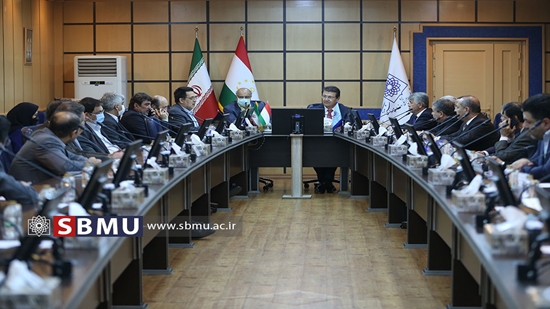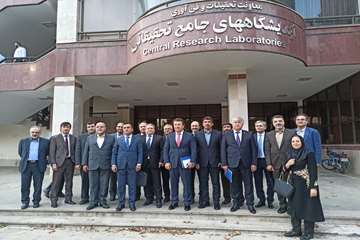Vice- Chancellor of International Affairs
Meeting of Minister of Health of Tajikistan with the University Chancellor of Shahid Beheshti University of Medical Sciences
In order to strengthen cooperation, the Minister for Health of Tajikistan considers that this institution is one of the best medical schools at national level and internationally.

The university board of directors hosted Tajikistan 6 health officials, minister, and the First Secretary of Tajikistan in Iran in presence of accompanying delegation of Ministry of Health. The main goal of this program was introduction of participants with medical training of Islamic Republic of Iran and signature of a memorandum of understanding during a three-day-meeting that was held in Shahid Beheshti University of Medical Sciences.
In this meeting Dr. Alireza Zali, Chancellor of the University, Dr. Babak Sharif Kashani, Vice Chancellor of International Affairs of the University, Dr. Hassan Piri, Executive Advisor and Director of the University Presidency, Dr. Ali Haeri, Advisor to the University Chancellor, Dr. Afshin Zarghi, Vice-Chancellor of Research and Technology of the University, Dr. Mohammad Reza Sohrabi, Vice-Chancellor of University Health Affairs, Dr. Abdul Rahim Nik Zamir, Dean of the School of Medicine, Mozhgan Jezizadeh Karimi, Director of Public Relations of the University, Dr. Kiandakht Qanati, Director of Educational and Research Affairs of the International Deputy, Dr. Farshad Akhovatian, director of international affairs development of the International Deputy, Engineer Seyyed Javad Emamizadeh, Executive Vice-Chancellor of the International Vice-Chancellor from the university was present, and Professor Jamaluddin Abdullahzadeh, the Minister of Health and Social Protection of the People of Tajikistan, Professor Mohammad Sha Golzadeh, President of Abu Ali Sina State Medical University, Professor Mohiuddin Nooruddin, President of the Tajik Institute of Postgraduate Medical Education, Khoshbakht Sharif Zadeh, Director of Dushanbe Municipal Health Department, Khurshid Rostamzadeh, Director of Esteghlal Medical Hospital, Dr. Shir Ali Khalef, CEO of Saft Pharma Pharmaceutical Company from the Republic of Tajikistan, Nizamuddin Zahedi, Ambassador of the Republic of Tajikistan to the Islamic Republic of Iran, Famous First Secretary of the Embassy of Tajikistan in Iran, and from the Ministry of Dr. Amir Khani, Deputy Director of the General Department of International Cooperation, Dr. Rezvani, the Internal Director of International Cooperation, Dr. Pikri, the Secretary of the International Council of the Vice-Chancellor of Education, and Mr. Babaei from the department of formalities of the Ministry were present.
This meeting, after welcoming words of Dr. Sharif Kashani, continued with Dr. Zali’s introduction of the history, facilities and capabilities of the university in various educational fields, referring to the cultural richness of Tajikistan and the cultural background, language and common scientists of the two countries, research and treatment fields, international honors and university contracts.
Dr. Zali also mentioned new methods using stem cells to treat cancer, cerebral palsy and autism. He then expressed hope for the establishment of a joint health center in line with the development of close cooperation between Ibn Sina University of Tajikistan and Shahid Beheshti University of Medical Sciences.
Then Mr. Jamal Aldin Abdollahzadeh showed his appreciation for being invited and present at one of the greatest universities of Iran and also, he expressed his positive view regarding the development of future cooperation.
He pointed out that our alliance is necessary and the result of this cooperation will be fruitful for both sides and will improve the research skills and knowledge of their doctors.
Then a memorandum of understanding was concluded between Ibn Sina University of Tajikistan with Shahid Beheshti University of Medical Sciences.
Further, the guests visited the faculty of pharmacy and central research laboratories and got familiar with their activities and at the end they had a meeting with directors of knowledge-based companies through which novel products and technologies for treatment of diseases were introduced.




Comment